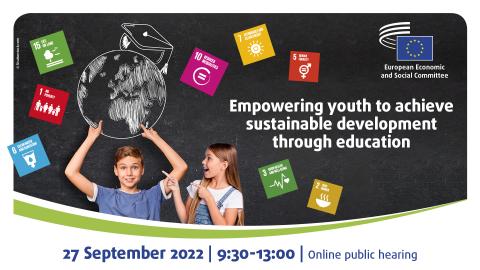European Economic
and Social Committee
Empowering youth to achieve sustainable development through education
Scope and objectives
On 27 September 2022 the European Economic and Social Committee (EESC) will host a public hearing in the context of its own-initiative opinion Empowering youth to achieve sustainable development through education.
Building on the outcome of the first public hearing held last April, which focused on limitations and barriers, this event aims to explore innovative ideas to foster opportunities and overcome challenges for the implementation of a transformative education for sustainable development.
In particular, this public hearing seeks to address the following questions:
- What is the state of play of EU initiatives and their implementation in Member States?
- How can we turn good practices into a blueprint for sustainable and transformative education?
- What are the key enablers needed for a sustainability education that helps implement SDGs at national and regional level?
Registrations will close on Monday 26 September 2022 at 10:00 CEST.
Background
Education for Sustainable Development is recognized as an integral element of Sustainable Development Goal 4 (SDG 4) on quality education and a key enabler of all other SDGs. Specifically, target SDG 4.7 aims to ensure that "all learners acquire knowledge and skills needed to promote sustainable development, including, among others, through education for sustainable development and sustainable lifestyles, human rights, gender equality, promotion of a culture of peace and non-violence, global citizenship, and appreciation of cultural diversity and of culture’s contribution to sustainable development".
The objective of the EESC's own-initiative opinion on youth, education and sustainable development is to make recommendations for change, in order to:
- analyse whether and how SDGs are embedded in the educational curriculum of the Member States;
- examine whether the approach by the respective Member States can be considered as a transformative education for sustainable development which can lead to a sustainable future and detect the limitations and barriers to implement such an education on a national level;
- provide recommendations to support the EC and MS on how to foster opportunities and overcome challenges to further develop youth policies while ensuring that education to sustainable development is mainstreamed from an early stage.
In light of the war in the Ukraine, the objective is not only to look at the ambition for a green and just transition but also to ensure that education contributes to the promotion of a culture of peace which is the core of the UN Agenda 2030.
The public hearing aims to feed innovative ideas and concrete recommendations to the own-initiative opinion in view of current EU's initiatives. While the state of play and the limitation and barriers in the EU Member States were discussed in a first hearing on 26 April 2022, this debate will be focused at how to foster opportunities and overcome challenges by looking at existing national, European and global initiatives, policies and best practices for a truly transformative education. The debate builds on the outcomes of the first hearing and the recent Council conclusion on fostering engagement among young people as actors of change in order to protect the environment and the Council recommendation on learning for the green transition and sustainable development.
Do you have a question?Contact us!
